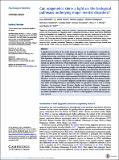Por favor, use este identificador para citar o enlazar a este item:
http://hdl.handle.net/10261/306646COMPARTIR / EXPORTAR:
 SHARE
BASE SHARE
BASE
|
|
| Visualizar otros formatos: MARC | Dublin Core | RDF | ORE | MODS | METS | DIDL | DATACITE | |

| Título: | Can epigenetics shine a light on the biological pathways underlying major mental disorders? |
Autor: | Alameda, Luis; Trotta, Giulia; Quigley, Harriet; Rodríguez, Victoria; Gadelrab, Romayne; Dwir, Daniella; Dempster, Emma; Wong, Chloe C. Y.; Di Forti, Marta | Palabras clave: | Mental health disorders DNA-methylation Epigenetics Childhood trauma |
Fecha de publicación: | jul-2022 | Editor: | Cambridge University Press | Citación: | Psychological Medicine 52(9): 1645-1665 (2022) | Resumen: | A significant proportion of the global burden of disease can be attributed to mental illness. Despite important advances in identifying risk factors for mental health conditions, the biological processing underlying causal pathways to disease onset remain poorly understood. This represents a limitation to implement effective prevention and the development of novel pharmacological treatments. Epigenetic mechanisms have emerged as mediators of environmental and genetic risk factors which might play a role in disease onset, including childhood adversity (CA) and cannabis use (CU). Particularly, human research exploring DNA methylation has provided new and promising insights into the role of biological pathways implicated in the aetio-pathogenesis of psychiatric conditions, including: monoaminergic (Serotonin and Dopamine), GABAergic, glutamatergic, neurogenesis, inflammatory and immune response and oxidative stress. While these epigenetic changes have been often studied as disease-specific, similarly to the investigation of environmental risk factors, they are often transdiagnostic. Therefore, we aim to review the existing literature on DNA methylation from human studies of psychiatric diseases (i) to identify epigenetic modifications mapping onto biological pathways either transdiagnostically or specifically related to psychiatric diseases such as Eating Disorders, Post-traumatic Stress Disorder, Bipolar and Psychotic Disorder, Depression, Autism Spectrum Disorder and Anxiety Disorder, and (ii) to investigate a convergence between some of these epigenetic modifications and the exposure to known risk factors for psychiatric disorders such as CA and CU, as well as to other epigenetic confounders in psychiatry research. | Versión del editor: | https://doi.org/10.1017/S0033291721005559 | URI: | http://hdl.handle.net/10261/306646 | DOI: | 10.1017/S0033291721005559 | ISSN: | 0033-2917 1645–1665 |
| Aparece en las colecciones: | (IBIS) Artículos |
Ficheros en este ítem:
| Fichero | Descripción | Tamaño | Formato | |
|---|---|---|---|---|
| mental-disorders.pdf | 737,62 kB | Adobe PDF |  Visualizar/Abrir |
CORE Recommender
PubMed Central
Citations
5
checked on 27-may-2024
SCOPUSTM
Citations
21
checked on 22-may-2024
WEB OF SCIENCETM
Citations
14
checked on 29-feb-2024
Page view(s)
31
checked on 28-may-2024
Download(s)
18
checked on 28-may-2024

